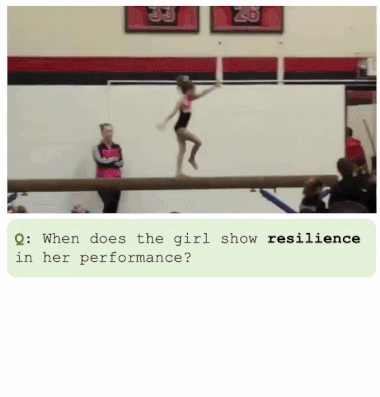De-An Huang, Shijia Liao, Subhashree Radhakrishnan, Hongxu Yin, Pavlo Molchanov, Zhiding Yu, Jan Kautz
-
The environment requirements are mostly the same as LLaVA. In addition, install
ffmpeg. -
Clone this repository and navigate to LITA folder
git clone https://github.com/NVlabs/LITA.git
cd LITA- Install Package
pip install --upgrade pip # enable PEP 660 support
pip install -e .- Install additional packages for training cases
pip install ninja
pip install flash-attn --no-build-isolation
See Preparing Datasets for LITA.
| Model Name | LLM version | Weights |
|---|---|---|
| LITA-13B-v1.3 | Vicuna-13B-v1.3 | Link |
First, downlaod the LITA weights from above.
python -m lita.serve.gradio_web_server \
--model-path <weights-dir>/lita-vicuna-v1-3-13b-finetune To create a public link, append --share to the above command. You can also launch the demo with quantized bits (4-bit, 8-bit) by appending --load-4bit or --load-8bit. Note that inference with quantized bits may not be as accurate as the full-precision model.
We also provide inference using CLI without the need of Gradio interface.
python -m lita.serve.cli \
--model-path <weights-dir>/lita-vicuna-v1-3-13b-finetune \
--visual-path <video-path> --visual-data-type video<video-path> is the path to the input video. Inference with quantized bits (--load-4bit or --load-8bit) also works here.
The LITA model only uses one stage supervised fine-tuning. The linear projection is initialized by the LLaVA pretrained weights. The training uses 8 A100 GPUs with 80GB memory.
git clone https://huggingface.co/lmsys/vicuna-13b-v1.3
git clone https://huggingface.co/liuhaotian/llava-pretrain-vicuna-13b-v1.3
mv vicuna-13b-v1.3 vicuna-v1-3-13b
mv llava-pretrain-vicuna-13b-v1.3 llava-vicuna-v1-3-13b-pretrainSimilarly for 7B checkpoints. Replace 13b with 7b in the above commands.
The LITA model can be trained using the supervised fine-tuning script here. First update information in the script such as dataset directory (--data_path) and checkpoint directory (./checkpoints).
cd LITA
sh scripts/finetune_vid.shWe provide the evaluation pipeline for the ActivityNet-RTL dataset. Please first follow the dataset instruction and refer to our paper for more details.
- Generate LITA responses and evaluate temporal localization metrics (mIOU and P@0.5)
python lita/eval/eval_model_rtl.py \
--model-path <weights-dir>/lita-vicuna-v1-3-13b-finetune \
--question-file \
<datasets-dir>/temporal_reasoning/annot_val_1_q229.json \
--image-folder \
<datasets-dir>/activitynet-captions/activitynet_frames \
--output-dir \
<result-dir>/lita-vicuna-v1-3-13b-finetune- Evaluate the generated responses using GPT-4
OPENAI_API_KEY="sk-***********************************" python lita/eval/eval_gpt_review_rtl.py \
--context <datasets-dir>/activitynet-captions/val_1.json \
--answer \
<result-dir>/lita-vicuna-v1-3-13b-finetune/answers.json \
--rule lita/eval/table/rule.txt \
--output <result-dir>/reviews/lita-vicuna-v1-3-13b-finetune.jsonl- Summarize the evaluation results
python lita/eval/summarize_gpt_review.py -f <result-dir>/reviews/lita-vicuna-v1-3-13b-finetune.jsonlCopyright © 2024, NVIDIA Corporation. All rights reserved.
This work is made available under the Nvidia Source Code License-NC. Click here to view a copy of this license.
The pre-trained models are shared under CC-BY-NC-SA-4.0. If you remix, transform, or build upon the material, you must distribute your contributions under the same license as the original.
For business inquiries, please visit our website and submit the form: NVIDIA Research Licensing.
If you find LITA useful for your research and applications, please cite using this BibTeX:
@article{huang2024lita,
title={LITA: Language Instructed Temporal-Localization Assistant},
author={De-An Huang and Shijia Liao and Subhashree Radhakrishnan and Hongxu Yin and Pavlo Molchanov and Zhiding Yu and Jan Kautz},
journal={arXiv preprint arXiv:2403.19046},
year={2024}
}- LLaVA: the codebase we built upon

